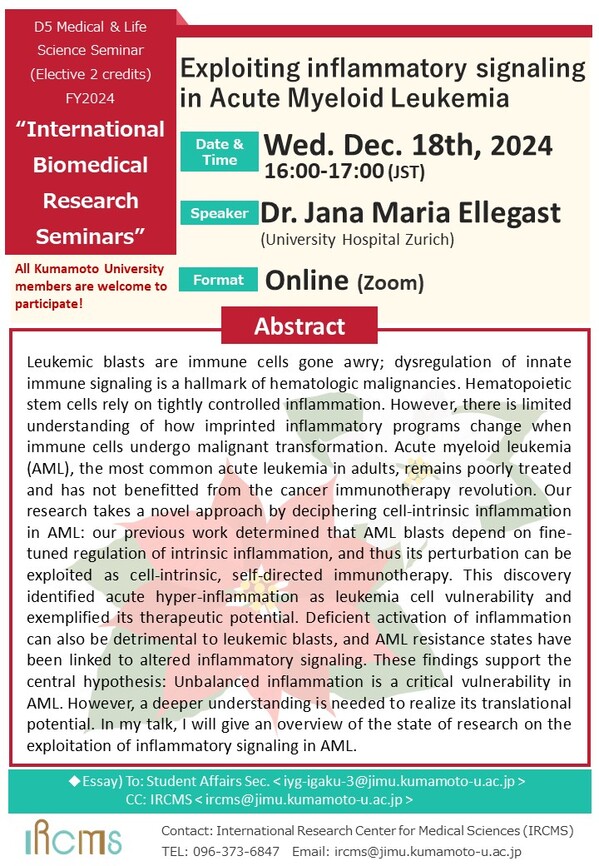- HOME
- News & Events
- [Dec. 18] D5 Seminar-Dr. Jana Maria Ellegast (University Hospital Zurich)
News & Events
[Dec. 18] D5 Seminar-Dr. Jana Maria Ellegast (University Hospital Zurich)
November 26 2024
The "D5 Medical & Life Science Seminar" course will be offered by International Research Center for Medical Sciences (IRCMS). It will run from May 2024 to March 2025, with lectures given by scientists who are affiliated with IRCMS or in collaboration with researchers at IRCMS. The lectures will be given once a month, in English, and by leading scientists in the relevant research field. Students will be taught: 1) how normal physiological functions are maintained in the human body; 2) how these systems become abnormal under certain pathophysiologic conditions; 3) why stem cells are important in animal development and homeostasis; 4) how stem cell-based approaches can help us understand disease mechanisms and find potential cure for diseases related to stem cell malfunction (e.g., cancer, aging).
Anyone who wants to join is welcome.
For students who have registered for the course, please check your attendance in Moodle.
Date : December 18, 2024 (Wednesday)
Format : Online
Time : 16:00 - 17:00 (JST)
Speaker : Dr. Jana Maria Ellegast (University Hospital Zurich)
Title : Exploiting inflammatory signaling in Acute Myeloid Leukemia
Abstract :
Leukemic blasts are immune cells gone awry; dysregulation of innate immune signaling is a hallmark of hematologic malignancies. Hematopoietic stem cells rely on tightly controlled inflammation. However, there is limited understanding of how imprinted inflammatory programs change when immune cells undergo malignant transformation. Acute myeloid leukemia (AML), the most common acute leukemia in adults, remains poorly treated and has not benefitted from the cancer immunotherapy revolution. Our research takes a novel approach by deciphering cell-intrinsic inflammation in AML: our previous work determined that AML blasts depend on fine-tuned regulation of intrinsic inflammation, and thus its perturbation can be exploited as cell-intrinsic, self-directed immunotherapy. This discovery identified acute hyper-inflammation as leukemia cell vulnerability and exemplified its therapeutic potential. Deficient activation of inflammation can also be detrimental to leukemic blasts, and AML resistance states have been linked to altered inflammatory signaling. These findings support the central hypothesis: Unbalanced inflammation is a critical vulnerability in AML. However, a deeper understanding is needed to realize its translational potential. In my talk, I will give an overview of the state of research on the exploitation of inflammatory signaling in AML.
2-3 Major Papers:
1. Ellegast JM, Alexe G, Hamze A, et al. Unleashing Cell-Intrinsic Inflammation as a Strategy to Kill AML Blasts. Cancer Discov. Jul 6 2022;12(7):1760-1781. doi:10.1158/2159-8290.CD-21-0956
2. Bennett J, Ishikawa C, Agarwal P, et al. Paralog-specific signaling by IRAK1/4 maintains MyD88-independent functions in MDS/AML. Blood. Sep 14 2023;142(11):989-1007. doi:10.1182/blood.2022018718
Flyer: (Click to enlarge)

